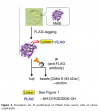T-5224
T-5224 is a small molecule that is non-peptidic in nature. It acts as an inhibitor of activator protein/c-Fos (transcription factors) by inhibiting the binding of activator protein AP-1 to the AP binding site, thus showing anti-inflammatory effects. It regulates the gene expressions for the pro-inflammatory cytokines. This activator protein AP-1 acts as a transcription factor which is consist of c-Fos proteins. Similarly, it inhibits the binding activity of the DNA of c-Fos. One of the studies conducted on the therapeutic effect of T-5224 explained that, when T-5224 is orally given, it resolves collagen-induced arthritis in the mice by regulating the secretions of pro-inflammatory cytokines including IL-6 & IL-1Beta.

Figure 1:Structural representation of T-5224
Studies suggest that due to its ability to inhibit the activator protein AP-1, it can be used to treat acute kidney injuries induced by sepsis. This sepsis-induced AKI is associated with the inflammatory response of sepsis and accounts for a 70–80 % mortality rate in ICU. Generally, sepsis is mediated through the secretions of interleukins and cytokines in response to infections. This inflammatory and cytokine response is regulated through the activator protein AP-1. This AP-1 binds to the promotor and allows the activation of cytokines. As we know that, this novel small molecule can inhibit the AP-1, and thus can be used to lessen the mortality rate of AKI. In this study, they divide the mice into four major groups including a control group, an LPS group, LPS + T-5224 group, and a T-5224 group. They found that this novel compound inhibits the tumor necrosis factor α and HMBG-1, which are early and late pro-inflammatory responses respectively in acute kidney injuries induced by LPS. Similarly, it also decreased the level of blood urea nitrogen and level of creatinine by inhibiting the transactivation of pro-inflammatory responses by inhibiting the activator protein AP-1. As we know that patients with sepsis have immunosuppression along with hyperinflammation. In addition to the control of inflammation, the control of immunosuppression is also very important for the survivability of the patients, because this immunosuppression leads to the cause of further lethal infections. This study also suggests that treatment of T-5224 right after the LPS injection controls the pro-inflammatory cytokines and increases the level of IL-10 which acts as anti-Inflammation. Moreover, this T-5224 is also beneficial for patients which have immune suppression. But it requires additional research to be clear. It increases the survivability of the patient. This LPS-induced AKI has a higher HMGB-1 serum concentration. The level of HMGB-1 (DNA binding protein) in serum rises as a result of the interaction between endotoxins and macrophages. The macrophages which are stimulated through endotoxins, release HMGB-1 in the blood after 12-18 hours. Treatment with T-5224 inhibits the release of HMGB-1 from the macrophages, thus increasing the survivability rate in individuals. So, it can be used as an effective therapeutic agent for the treatment of sepsis-induced AKI.
Similarly, this novel molecule can be used against functional pituitary adenomas (FPA). The study conducted on the effects of T-5224 on the FPA revealed that it reduces the level of proliferation of the functional pituitary adenoma cells. They stated that, when the cell lines GT1-1 and GH3 are treated with the T-5224, they show decreased level of cellular viability as compared to the control group measured through MTT assay. They also found that the cells treated with T-5224 showed a lower level of clonogenicities as compared to the control in a dose-dependent manner. Similarly, T-5224 also induces apoptosis in the FPA cells. Via flow cytometry analysis, they revealed that the cell lines which are treated with T-5224 have a dominant number of apoptotic cells as compared to the control group, which has a dominant number of normal cells. All this happens because of the inhibitory action of T-5224 on the activator protein AP-1/c-Fos. As we know that, the c-Fos is the major component of the transcription factors AP-1, and the tumor cells have hyperactivated transcription factors. This will help them to increase the growth and proliferation of tumor cells in different types of cancers. Similarly, these tumor cells have a mutation in the p53 signaling pathway, which is involved in the cell cycle arrest, and apoptosis of the cells. This inhibition of the p53 signaling pathway is due to the hyperactivation of c-Fos/c-Jun. Thus, T-5224 upon inhibition of the AP-1/c-Fos decreases the level of inhibition of the P53 signaling pathway, which leads the tumor cells to undergo apoptosis.
Due to its ability to inhibit AP-1, it can be used to prevent lymph node metastasis in the Head & Neck squamous cell carcinoma. A study conducted on these effects states that the activator protein AP-1 played a major role in the proliferation and progression of the tumor cells. It is because this activator protein AP-1 controls the gene expressions for tumor migration & invasion. They conducted an in-vitro experiment with the use of different techniques including WST-8 assay, gelatin zymography, and invasion assay to figure out the in-vitro effects of T-5224 in the orthotopic model of the mouse to study the invasion, migration, and MPP activity of T-5224. In this experiment, they studied cervical lymph node metastasis by using the orthotopic model of squamous cell carcinoma in humans (HSC-3-M3). They transferred it into the tongue of mice (BALB/c nude). After that, they orally give the T-5224 at a dose rate of 150mg/kg of the body weight. After conducting they found that, the T-5224, inhibits the MMP-9 & MMP-2 expressions. They also stated that this molecule also decreases the motility of the cell. As we know that metastasis is a multistage process. It starts with the increasing infiltration of the tumor cells into the metastatic site by degradation of the extracellular matrix through the decrease in the adhesions of the tumor cells in the primary site. This degradation of the extracellular matrix, which is composed of collagen protein, proteoglycans, and other protein molecules is degraded with MMP-2 & MMP-9 (are proteolytic enzymes). These 2 enzymes hence are essential for tumor metastasis by type 4 collagen degradation. So use of T-5224 decreases cell motility and inhibit these proteolytic enzymes from inhibiting lymph node metastasis.

Figure 2:Effects of T-5224 usage on the activities of MMP-2 & MMP-9














Kommentare